CSotD: State of Disunion
Skip to comments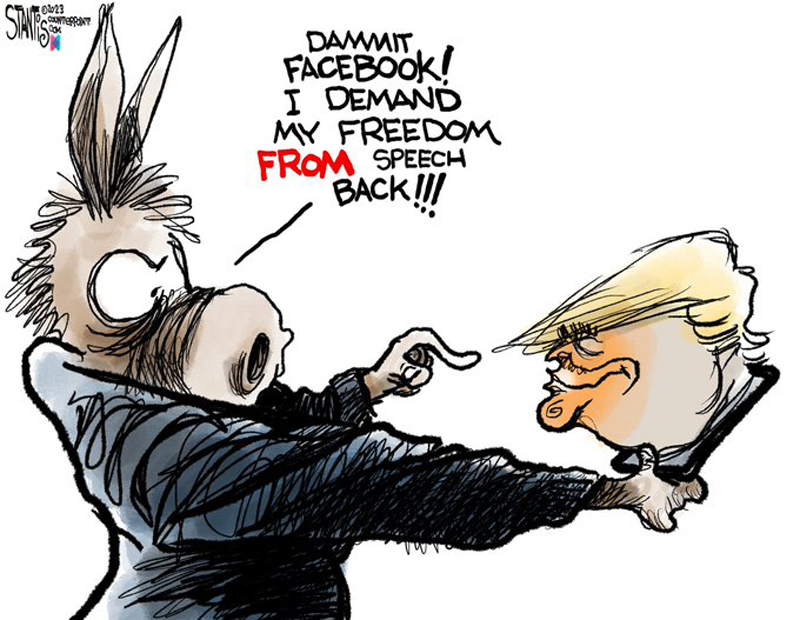
Scott Stantis (Counterpoint) brings up the question of the First Amendment, which doesn’t apply to private companies except, perhaps, in communist countries where the central government controls industry. But that itself offers a lot of fodder, because moderation of media is very much on the table at the moment.
The rightwing blogosphere is currently in an uproar because DirectTV has dropped Newsmax, and Republicans are pledging to examine this suppression of conservative speech.
But the problem appears to be a private industry matter: Newsmax had previously been carried free and now wants to be paid. DirectTV did not want to have to increase fees for customers, particularly since few of them watch Newsmax anyway.
Leaving open the question of why the GOP is not investigating FUBO for not carrying CNN?
Specific to Trump, he was booted off mainstream social media for spreading disinformation and for inflaming a violent insurrection, and his actions on his own platform, Truth Social, do not indicate a pattern of reform:
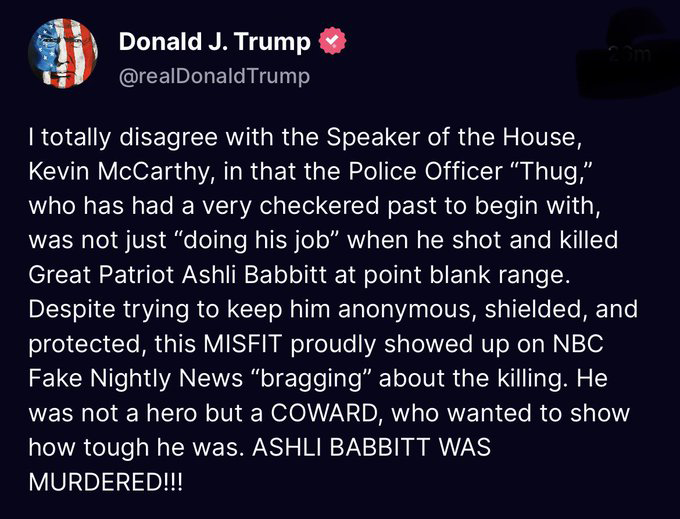
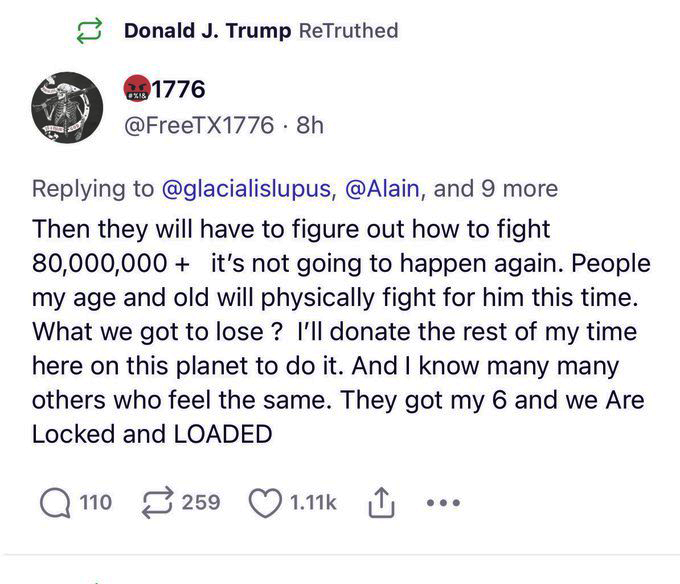
Are these examples of free speech? Most likely, yes. Justice Holmes famously mused that the First Amendment would not protect someone from falsely shouting fire in a crowded theater, but that wasn’t a part of his formal decision, in which SCOTUS declared it illegal to encourage resistance to the draft.
In other words, it was bad legal reasoning, attached to what we now recognize as a bad legal decision.
But, beyond all that, what is legal to say standing on a soap box on a street corner won’t protect you from being thrown out of a bar as an obnoxious troublemaker.
Not even if that bar is owned and operated by the Central Committee, in which case you will soon learn that there aren’t a lot of communist governments that — despite their rhetoric — truly encourage, or even permit, free speech.

Tim Campbell (Counterpoint) extends the debate into another area, the report from the Surgeon General suggesting that social media is harmful for immature brains.
Campbell gets a laff out of the crossover, but raises a reasonable question, which is whether it’s more harmful for kids, or simply harmful. It reminds me of the old pro-marijuana argument, “Then why is alcohol legal?”
The best answer was “Because it already is, and you can see what happened when we tried to jam that toothpaste back into the tube.”
Social media is already out there, and, if you can’t do a few sensible things, like making kids leave their phones in their lockers at school and down in the living room when they go to bed at night, well, I guess I can’t help you.
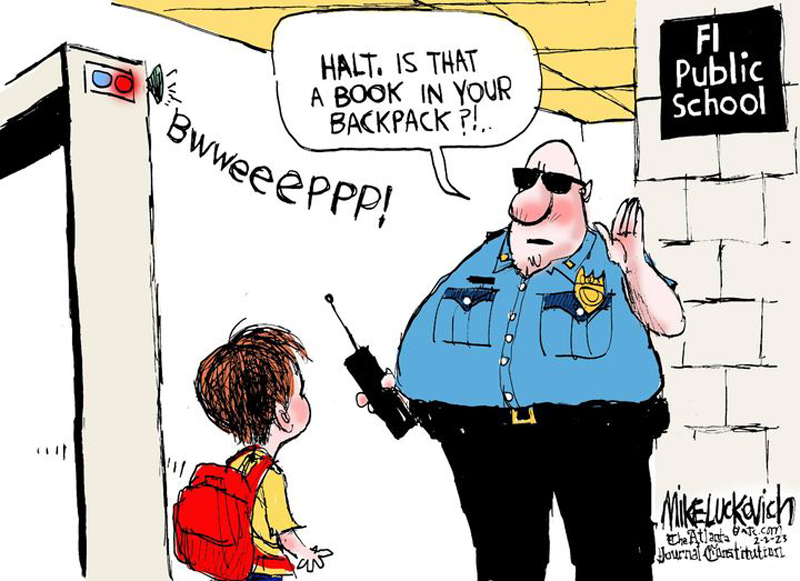
Anyway, we don’t need cell phones to screw up our kids’ brains.
Mike Luckovich notes Florida’s new regulations, in which schools may only feature books that have been approved by the government. Aside from the ban on the AP course in African-American History, this extends to textbooks, library books and any other books available to students.

We can argue over the governor’s intent, but the way it has played out is that schools have removed or covered all books pending review from the Ministry of Truth. And the intent is clear that only approved materials will be permitted, however clumsily the goal is achieved.
Which in turn makes it unclear the degree to which Luckovich exaggerates in making his point.

I’m pretty sure, on the other hand, that Tom the Dancing Bug is exaggerating, mostly because it would be easier for Florida schools to find books that already fit the requirements than to pay to revamp existing books.
If nothing else, they could get recommendations from the Ohio-based homeschooling network with 3,000 members, which is accused of using white supremacist and Nazi-inspired materials, but simply explains that “Without homeschooling the children, our children are left defenseless to the schools and the Gay Afro Zionist scum that run them.”
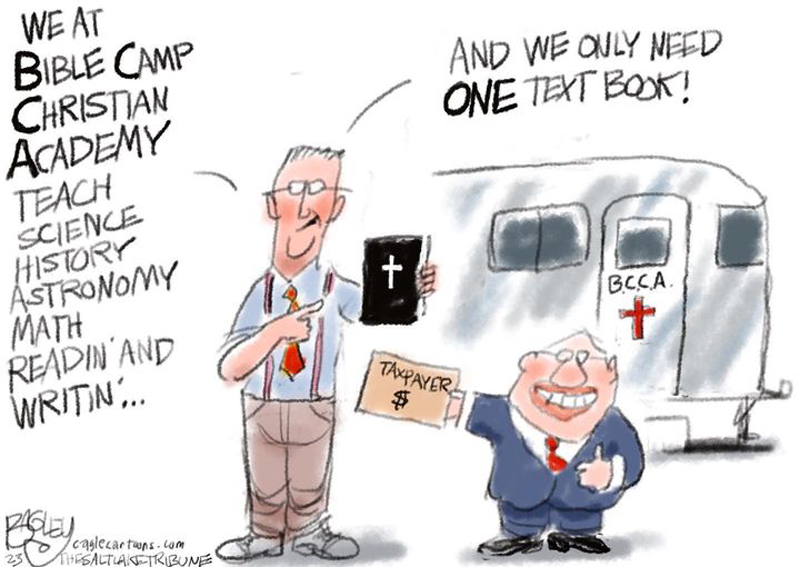
Note that, while Ohio offers some support to private schools, homeschoolers there are financially on their own.
But, in Utah, Pat Bagley picks up on an important issue in all this, which is that, while parents may indeed have a right to educate their children as they wish, taxpayers may also claim a right to some input on the schools they are paying to support.
When I was working with schools in New York some 20 years ago, the rule was that the state would help support overall education in private schools, but religious subjects could not be taught using state funds. This, of course, meant no funding for religion itself, but extended to, for instance, science books that taught creationism.
But when one of my boss’s daughters, who went to a Catholic elementary school, was diagnosed with dyslexia, she was eligible for the public district’s special ed interventions. Seemed fair to me.
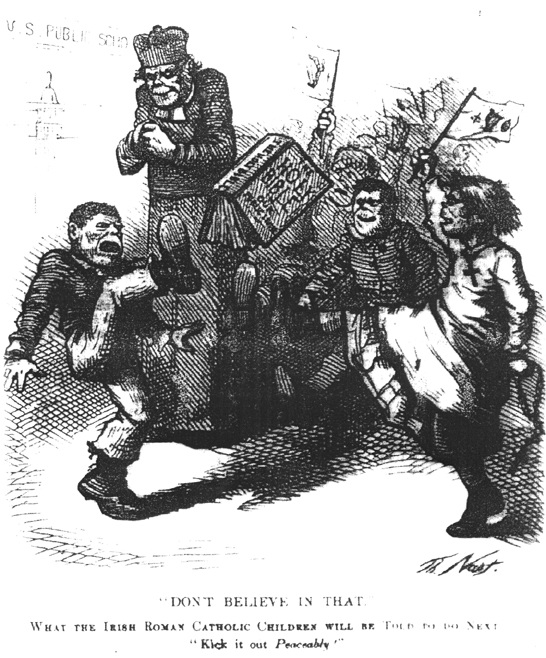
I don’t know if Florida is banning Irish-American History courses, but I’d point out that, much as Thomas Nast hated priests for encouraging Irish monkey-children to kick the Bible out of public schools, the alternative to Protestant evangelizing in the classroom was for Catholics to found, and to pay for, their own parochial school systems.
It was part of that whole “Make America Great” deal.

Finally, if governmental overreach in the classroom doesn’t bother you, Ann Telnaes notes a Big Brotherism that ought to scare the hell out of women, or anyone born of women, married to women, or a parent to women or who gives a damn at all about women.
Or about their own privacy, because “First they came for the women …”

The Pro Publica report goes on to explain how the data shared by these companies can be tracked back to individual purchasers, noting that, while Google has promised to remove tracking data showing visits to Planned Parenthood and other pro-choice locations, there’s no privacy protection for purchases under HIPPA or any other federal law against revealing what you buy from pharmacies.
Should you care? After all, when SCOTUS overturned Roe v Wade, the conservatives crowed with pleasure that abortion would now be determined by the individual states.
So you only need to worry about law enforcement in your own state, should they declare the pills illegal.
Or if some federal judge in Texas decides they should be illegal nationwide.
Or if powerful anti-abortion lobbying groups demand candidates back a federal anti-abortion law in 2024.
Comments 4
Comments are closed.